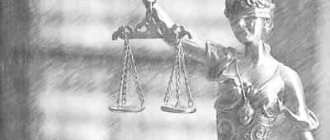For management organizations and property owners' associations there is a separate headache - apartments whose owner has died. Such apartments stand idle, often no one lives in them until the inheritance is formalized (and in our country this can take years!). And there is also a very difficult case: the heir did not show up at all, and then the apartment, after long ordeals, becomes the property of the state, becoming the so-called “escheat” property.
How to oblige the heir to pay the debt for housing and communal services from the moment of death of the testator until the moment of registration of the inheritance?
Today we will answer this question in detail.
Legislation regarding the death of a borrower
The law quite clearly regulates what happens to financial obligations upon the death of the borrower: this is stated in Articles 1110, 1112, 1175 of the Civil Code of the Russian Federation. According to these articles, credit obligations are included in the inheritance mass and are considered the same object of inheritance as assets. By inheriting property, a person also has to pay off the debts of a relative. The exception is obligations that are directly related to the personality of the deceased: for example, the payment of child support (in this case we are talking about obligations, and not about possible debts). Article 1175 also states that inheritance occurs jointly, that is, with regard to financial burdens, all heirs have equal rights. Liability also depends on how much of the deceased's assets a particular person inherited.
Reduce the price of the inherited apartment and sell it
Registration of an inheritance is accompanied by an application to a notary and an assessment of the property, the result of which can vary significantly, both up and down.
Legally savvy heirs, as a rule, prepare in advance an expert report on the value of the property being inherited, underestimated by thirty percent, and then sell it, drawing up an agreement also at a reduced price. Under such circumstances, debts are reimbursed not in the amount of the real market value of the apartment, but in the amount of its assessed value. In this way you can get a benefit of 30%. “In one of my disputes, the court ordered an examination three times to determine the value of an apartment near Moscow, and each time the result varied significantly,” says lawyer Oleg Sukhov. — Some experts named the amount at 1 million 100 thousand rubles, others at 5.5 million rubles, and still others at 3.5 million. This example is very indicative, since it confirms the practical possibility of independently and significantly influencing the result of assessing the size of the value of the inheritance received.”
In what order are the requirements presented?
The opinion that obligations pass to the heirs only after six months from the death of the borrower is erroneous. The loan continues to be valid, and if you do not notify the lender about what happened, penalties and late fees will be accrued in the same way. Any of the actual heirs is obliged to provide the creditor with copies of the death certificate, after which the banking organization can suspend the accrual of interest and penalties. If any have already been accrued since the client's death, they must be cancelled. After this, credit obligations are transferred to the one who accepted the open inheritance, that is, received the appropriate certificate. If there are several such people, the debt is divided among them depending on the value of the share of the inheritance they received. Banks do not take into account the age of the heirs and their awareness of the existence of financial obligations.
How is an inheritance accepted?
The heirs must accept the inheritance in any possible way so that the creditors of the deceased can present their claims. There are several ways to accept an inheritance.
- Upon application of a notary with the issuance of a Certificate of Right to Inheritance . The citizen recognizes his right to own the property of the deceased, his obligation to bear responsibility for the debt obligations of the testator and wishes this. In this case, the heir's right is confirmed by relevant documents and legislation, on the basis of which the notary issues a Certificate.
- By the tribunal's decision. In some cases, heirs enter into inheritance by filing a corresponding claim with the judicial authorities. The court, having checked the provided evidence of the legality of the claims, makes a decision on the basis of which the notary issues a Certificate.
- Actual acceptance. If a citizen has committed the actions provided for in Part 2 of Art. 1153 of the Civil Code of the Russian Federation, he is recognized as an heir unless otherwise proven.
In this case, the actual acceptance of the inheritance neutralizes the refusal of it directed to the notary. Consequently, if an apartment with debts was inherited and the citizen took measures to preserve the apartment and the property located in it, incurred expenses for the maintenance of the apartment or other property of the deceased, then he will have to answer for the debts of the testator. Therefore, the refusal must be clearly formulated and not subject to double interpretation.
Who pays the loan after the death of the borrower
The option in which the need to repay the debt passes to the heirs is not the only one. There are several other situations in which third parties will need to repay the loan.
Co-borrower.
For large purchases (car, apartment), the income of one person is not always enough to obtain a loan, so obligations are taken jointly. In this case, several people also receive rights to the collateral, and if one of them dies, the obligations and property pass to the remaining ones.
Guarantor.
In some cases, loan obligations are provided to the client with the participation of a guarantor - a person who, under unforeseen circumstances, is ready to take responsibility for the loan. If the borrower dies, his debts, including fines and late fees, pass to the guarantor within the limitation period and the amount of the estate. He has the right to claim part of the inheritance to pay off debts if the heirs abandoned the property. If they have entered into the right of inheritance, he can recover compensation from them for expenses by going to court, but only after paying all the funds.
Insurance Company.
Banking organizations prefer to encourage clients to purchase insurance along with signing a loan agreement. This is an optional condition according to the legislation of the Russian Federation, however, if a person agrees to purchase additional insurance, in the event of his death, the remainder of the debt will be paid not by the heir, but by the insurance company. Unfortunately, not every situation is considered an insured event. The company may refuse payment if the client died as a result of extreme sports or participation in hostilities, or concealed a chronic illness when signing the contract. In this case, payments also fall on the shoulders of the heirs.
Inheritance of debt obligations
Acceptance of an inheritance includes the concept of not only the transfer of rights to the heirs, but also the acceptance of the debts of the testator. Debts are distributed proportionally among the persons entering into the inheritance.
There are two types of debts :
- The first type of debt is associated with the death of the testator . Such debts include, in particular, funeral expenses, expenses for executing a will, etc.
- The second type of obligations are the direct debts of the testator himself . Debts arising from contractual obligations (purchase and sale agreements, loan agreements, utility bills, etc.).
Debts are transferred to the heirs jointly (i.e., the creditor has the right to demand fulfillment of the obligation from all heirs at once, or to apply for fulfillment to one heir). It should be remembered that in any case, the heir is liable only to the extent of the share of the accepted property.
Example
A loan agreement was concluded between citizen K. and V. and a corresponding receipt was drawn up. Citizen V. died, in connection with which citizen K. applied in court to the heirs of citizen V.: A., S., M., to collect the amount of debt from them in a joint and several manner. A., S., admitted the claims. M., did not support the claims. In support of this, he gave the following arguments: the receipt is of a dubious nature, funds were not provided under it, therefore this transaction is suspicious, which means that it should be cancelled.
Having analyzed the evidence, the court of first instance correctly came to the conclusion that the claim was satisfied and the recovery from the defendants jointly and severally in favor of the plaintiff.
What to do if you inherit a loan
First of all, try to calm down. Even if you did not know about the loan and were not prepared for such a turn of events, inheriting debt is not a death sentence. You may not have to pay the obligations: if you do not want this, you have the right to refuse the inheritance. If property is important to you and you are not going to refuse inheritance, contact the creditor. Clarify the possibility of restructuring and changing payment terms, refer to the circumstances. The same principle should be followed if the borrower’s creditor was not a banking organization, but a collection agency. Conscientious collectors meet clients halfway in such matters and are more willing than banks to provide individual favorable conditions.
How to collect payment for housing and communal services on escheated property
If the property of the testator is escheated property, demands for collection of debt for housing and communal services are presented respectively to the Russian Federation, the federal cities of Moscow and St. Petersburg or the municipality into whose ownership the escheated property is transferred by inheritance by law.
Requirements are presented in accordance with the general rules of law.
Find out more about debt collection in our article
What to do in difficult cases
The situation where the deceased person was burdened with a simple consumer loan is the most common. There are also non-standard cases that raise more questions.
The amount of debt exceeds the value of the inheritance.
If it turns out that the amount of funds that can be obtained from the sale of inherited assets cannot cover the financial obligations of the deceased, separate rules prescribed in Article 1175 of the Civil Code come into play. According to them, the heir is liable for debts only to the extent of the inheritance received. He should not pay more than he received. Often in such situations it is easier to refuse the property, since in any case it will be collected as compensation for the debt - only in case of inheritance you will have to manage this yourself.
Mortgage loan obligations.
An apartment purchased with a mortgage will go to the heirs if all obligations are met and nothing else is specified in the contract. Financial obligations will have to be paid either by them or by the guarantor, if present at the conclusion of the agreement.
Child support arrears.
The obligation to pay alimony in itself relates to the citizen’s personality and is not inherited, but if the person had debts on them, they also pass to the heir after death.
Who pays the debts of the deceased
First of all, you need to figure out who should pay the testator’s debts and to what extent. And Art. will help here. 1175 of the Civil Code of the Russian Federation, which states that all heirs are liable for the debts of the deceased. Moreover, this liability is joint and several, but in any case cannot exceed the value of the inheritance received.
However, it is worth considering that only those heirs who exercised their right to inheritance will pay. Moreover, they actually implemented it, which can be confirmed.
When does the debt pass to relatives?
Debt obligations are inherited regardless of the order of inheritance: according to the law or by will. The Civil Code does not contain exceptions regarding certain categories of heirs who can count on exemption from inheriting debts. They can be inherited both by the heirs of the first stage and the eighth.
Loans and other debts can be transferred from parents to children and vice versa. Minor children of the testator can also receive loan debts from their parent as an inheritance. But their adult guardians, trustees and parents will have to pay for them.
If the child is not yet 14 years old, then the inheritance is accepted by his parents; at the age of 14, the child does this independently with the written consent of the parents. These measures are necessary in order to protect the child from making rash decisions.
Debts are rarely included in a will, so they rarely pass to the heirs under the will. But such a situation, when all the property of the deceased goes to the persons listed in the will, and only debts go to the relatives, is in principle impossible.
Are debts inherited?
Many Russians believe that with the death of the testator, his outstanding loan debt is canceled and the obligation to repay the principal debt does not pass to the heirs. But in fact this statement is wrong.
The main document that regulates the procedure for entering into inheritance is the Civil Code. In Art. 1175 of the Civil Code stipulates the possibility of transferring debt obligations to an heir and indicates the obligation of the heirs to repay the debt for a deceased relative or loved one who left a will in their favor.
The estate, in addition to the property of the deceased (such as real estate, savings, shares, vehicles, etc.), also includes debts. The Civil Code does not decipher such a concept as the debts of the testator, but by referring to its individual provisions, you can make the following list of inherited debts:
- debt on loans;
- microloan from microfinance organizations;
- debts to third parties (individuals, officially confirmed, for example, by a receipt);
- obligations under annuity agreements or lease agreements;
- obligations under civil law transactions;
- debts and utilities housing and communal services;
- tax debt;
- fines and penalties incurred during the life of the testator.
Debts are transferred to the heirs who received property according to the law or will within the limits of their share. The simplest situation is when all property is inherited by one person, while when distributing debts between heirs, many disputes often arise.
It is worth considering that some types of debt obligations are not inherited after the death of the testator. These include those that the Civil Code (Article 418) refers to as “inextricably linked with the personality of the debtor.” This:
- arrears of alimony paid in favor of the testator's children;
- amounts payable as compensation for damage caused to the health or property of a third party (liability for legal claims);
- other rights and obligations that do not transfer under civil law or family law (for example, the obligation to finish a book by a certain deadline under the author’s agreement).
Liability for debts associated with the person of the testator ceases immediately after the death of the payer. All other debts are inherited.
The heirs can accept the inheritance only if they agree to fulfill their obligations regarding debts. The responsibility of the heirs in relation to the debts of the testator is subsidiary, i.e. equal to him.
Debts are transferred to the heirs in proportion to their shares. If one of the heirs single-handedly pays off all the debts of the testator, then he has the right to expect to receive compensation for his costs from the others.
If there are no heirs, then their rights and obligations pass to the state (the property is considered escheat).
When inheriting debt obligations, heirs should take into account one important civil law rule, which is aimed at protecting their interests: the value of the inherited property cannot be less than the size of the debt obligations . This means that heirs cannot receive debts alone or sacrifice their property to pay the debts of a deceased relative.
If the heir dies before assuming the rights of inheritance, then the property is distributed according to the rule of transmission (Article 1156 of the Civil Code). In this case, debts are not inherited along with property.
How to avoid transfer of debt during inheritance
Heirs can legally refuse to pay debts for the testator. There are three options for them:
- Refuse inheritance in accordance with the established procedure.
- Do not take steps to enter into inheritance for six months.
- Initiate bankruptcy proceedings against the testator.
The Civil Code provides for the possibility of refusing inheritance. This option may be appropriate if the amount of debt obligations exceeds the value of the inherited property.
When applying for a waiver, two fundamental points should be taken into account:
- You can only renounce the entire inheritance: you cannot issue a waiver for debts and at the same time inherit assets in the form of property.
- The waiver does not have retroactive effect: after signing it, you will not be able to declare your rights to the inheritance.
The waiver must be issued by a notary within six months after the death of the testator.
You can refuse an inheritance not only through active actions, but also through inaction. It is believed that if the heirs do not turn to the notary to register the inheritance within six months after the death of the testator, then they lose their right to claim the property of the deceased. At the same time, they have the right to subsequently restore their rights through the courts.
Also, since 2015, individuals have been granted the opportunity to go bankrupt. Heirs can declare a certain citizen bankrupt after his death. After completing the procedure, all debt obligations are written off.
Before deciding to enter into an inheritance, it is worth clarifying information about the testator’s existing debts, as well as comparing the amount of debt and inherited property. Depending on how proportional and commensurate these two values are, a decision should be made on entering into an inheritance or refusing it.
In 2014, changes were made to the legislation, which are designed to protect the rights of heirs and protect them from inheriting assets along with debts. Now, as part of notarial proceedings, notaries can check the composition of the estate and make appropriate requests to the BKI about the testator’s existing debts to banks.
The credit history bureau must process the notary's request within 3 days of its receipt.
Forgery of signatures. Falsification of contracts
Various methods of “attacking” heirs, especially elderly people, socially vulnerable or weak in character, are common among scammers.
For example, having information about the death of the owner of an expensive home, criminals forge debt documents in his name: a receipt or a loan agreement for a tidy sum, which are subsequently presented to relatives who have inherited the property. “I don’t recommend rushing to repay the debt,” says lawyer Oleg Sukhov. — In my practice, there have been precedents twice when, as part of a forensic technical and handwriting examination, it turned out that in the first case the agreement was printed much later than the date of its signing by the debtor (the attackers used blank sheets with the testator’s signature, inserting the text of the loan agreement into them), in the second In this case, the examination showed that the signature on the receipt is similar, but not identical, i.e., it is not the signature of the borrower, but simply falsified. In both cases, the courts refused to collect funds from the heirs.”
Unlock access to the private part of Clerk with a Premium subscription. Get hundreds of webinars and online courses, unlimited consultations and other proprietary content for accountants.
Hurry up to subscribe with a 20% discount until October 15, 2021. Read more about “Premium” here.







